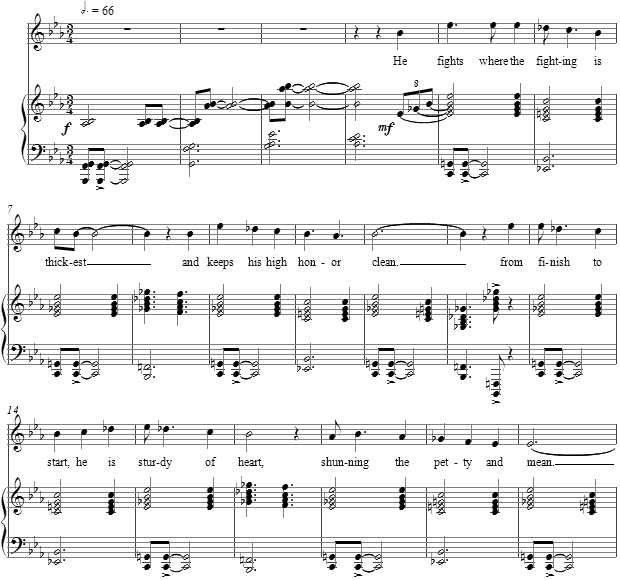Music and Texts of GARY BACHLUND
Vocal Music | Piano | Organ | Chamber Music | Orchestral | Articles and Commentary | Poems and Stories | Miscellany | FAQs
A Regular Sort of a Guy - (2007)
Eugene O'Neill
for medium voice and piano
He fights where the fighting is thickest
And keeps his high honor clean;
From finish to start, he is sturdy of heart,
Shunning the petty and mean;
With his friends in their travail and sorrow,
He is ever there to stand by,
And hark to their plea, for they all know that he
Is a regular sort of a guy.
He cheers up the sinner repentant
And sets him again on his feet;
He is there with a slap, and a pat on the back,
For the lowliest bum on the street;
He smiles when the going is hardest,
With a spirit no money can buy;
And take it from me, we all love him 'cause he
Is a regular sort of a guy.
I don't care for the praise of the nations,
Or a niche in the great hall of fame,
Or that posterity should remember me
When my dust and the dust the same;
But my soul will be glad if my friends say
As they turn from my bier with a sigh,
"Though he left no great name, yet he played out the game
Like a regular sort of a guy."[ 5 pages, circa 2' 00" ]
Eugene O'Neill
Born October 16, 1888, in New York, Eugene O'Neill is reputed to be among the 20th-century's best-known American dramatists. Educated at Princeton, he spent his early years working as a secretary in New York, as a gold-prospector in Honduras, as a seaman on trips to Buenos Aires, South Africa, and Southampton, and as a bit-player in his father's theatrical company. He wrote verse in these early years, but after spending six months in a sanatorium he turned to writing plays in 1913.
O'Neill won four Pulitzer Prizes for his plays Beyond the Horizon (1919), Anna Christie (1922), Strange Interlude (1928), and his semi-autobiographical drama on his own family, Long Day's Journey into Night (written 1940-41, published 1956). He won the Nobel Prize for literature in 1936. Others of his plays include The Emperor Jones (1921), The Hairy Ape (1922), All God's Chillun Got Wings (1924), Desire under the Elms (1924), the trilogy Mourning becomes Electra (1931), Ah! Wilderness (1932), The Iceman Cometh (1946), and Moon for the Misbegotten (1947). He died November 27, 1953.
Written with a vocal range of one octave in mind, this setting is a direct and aggressive restatement of O'Neill's fine text.
Just as with Cummings' sentiment expressed in Hokku (1916) from that same era, what is expressed is an openly male sentiment, in O'Neill's words, of the "regular sort of a guy." Such male traits as expressed by these poets are never fully fallen into disfavor, even after the buffeting of the cultural winds of feminism through the late twentieth century, for research into male role models in society as research into the very biological differences between the male and female in terms of thinking and character traits (and flaws) begin to reveal what was a clear truth to these poets. There is a type of man for whom "fighting" for just causes is right, and where the maintenance of "high honor" is worth keeping.
To underscore this overt, forceful and unapologetic sentiment, I chose to set a melody in E-flat minor with an accompaniment of shifting polytonal colors, underpinning the tonic with a relative bass line which competes with the tonic itself. Thus E-flat minor sings out over the C-G open fifth, to be answered by C major over the open fifths of E-flat and B-flat. The three strophes retain this character, with the rhythmic impulse forced ahead by the so-called "Scotch snap," which is a reflection of the text's scansion itself.
The score for A Regular Sort of a Guy is available as a free PDF download, though any major commercial performance or recording of the work is prohibited without prior arrangement with the composer. Click on the graphic below for this piano-vocal score.

